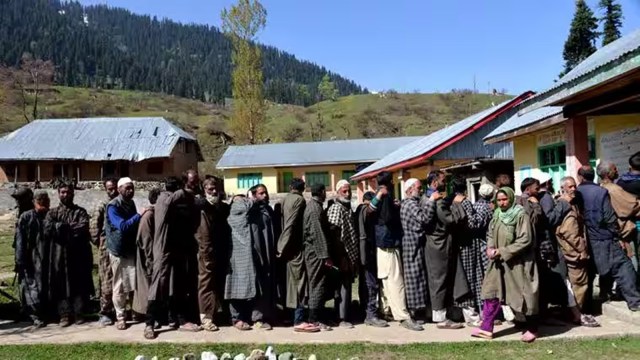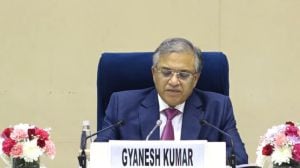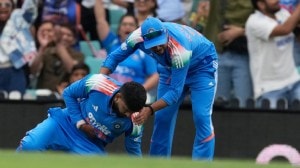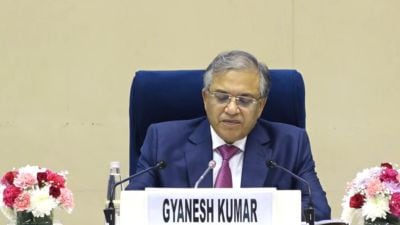No sign of local body polls in Jammu and Kashmir; BJP eyeing deferring of the exercise till 2024
The five-year term of elected Srinagar Municipal Corporation and Jammu Municipal Corporation will end on November 5 and 14 respectively, while that of municipal councils and committees by December 26 this year.
 The G D Sharma Commission constituted by the J&K government has already made its recommendations that are awaiting implementation. (File)
The G D Sharma Commission constituted by the J&K government has already made its recommendations that are awaiting implementation. (File) With the terms of corporation, councils and committees coming to an end later this month, there is no sign of re-elections being announced by the Jammu and Kashmir government this year. The last elections in J&K were held in 2018, before abrogation of Article 370.
The five-year term of elected Srinagar Municipal Corporation and Jammu Municipal Corporation will end on November 5 and 14 respectively, while that of municipal councils and committees by December 26 this year. According to officials, Panchayats will cease to exist on January 9, 2024, adding that elections to these urban and rural local bodies are now expected to be delayed till next year as the J&K government is yet to take a call on reservation for OBCs in these institutions of grassroots level democracy and also because Bharatiya Janata Party’s local unit has been pushing for deferring the exercise at least till the 2024 parliamentary polls.
Official sources in the administration told The Indian Express that post abrogation of Article 370 in J&K in 2019, all provisions of the Indian Constitution are applicable to the Union Territory including provision for reservation for OBCs. When asked whether the OBC reservation was mandatory in the case of local body elections, a senior official, while referring to the Supreme Court judgement, said: “In terms of the constitutional amendment for insertion of Article 342A (3) in the Constitution, the State/UT is obliged to prepare a list of socially and educationally backward classes (SEBCs) which can be acted upon for providing reservation to OBCs including in election to local governments”. It has laid down triple conditions for providing this reservation including setting up of a dedicated commission to collect empirical data on the OBC population, specifying the proportion of reservation and ensuring that cumulative share of reserved seats do not breach 50 per cent of the total seats, he added.
The G D Sharma Commission constituted by the J&K government has already made its recommendations that are awaiting implementation. Several political parties especially representatives of the OBC community have raised the issue when J&K’s Chief Electoral Officer, Pandurang K Pole sought objections to the draft notification regarding reservation of wards for scheduled castes (SC) and scheduled tribes (ST), women in open category, besides women among ST and SC on September 4. The last date for filing of objections was September 9, he added. Once the government takes a call on OBC reservation, it has to be followed by identification and reservation of municipal constituencies for them. This is sure to take time, he said.
The Congress had also highlighted discrepancies in the reservation of municipal wards, claimed chief spokesperson of the party’s J&K unit, Ravinder Sharma. The reservation of wards has to be done on the basis of rotation.
However, during the previous three elections to the urban local bodies, the same wards remained reserved for SCs and women. There has been no change in the pattern even at present, he said.
Apart from this, the Congress has also, in a letter to UT Lt Governor Manoj Sinha, questioned the admissibility of having two different authorities conducting local body elections especially when post abrogation of Article 370, all provisions of the Indian Constitution stand applicable to J&K including setting up of an independent State Election Commission for conducting both the urban and rural local bodies polls. Expressing concern over the initiation of electoral exercise for municipal elections in the UT by the chief electoral officer, Congress J&K president Vikar Rasool Wani demanded that these polls shall be conducted by the State Election Commission as mandated by the 74th amendment of the Indian Constitution. “Holding of municipal elections without the superintendence and control of the SEC was a clear violation of the 74th amendment of the Indian Constitution,” he said.
Mainstream opposition parties including NC, PDP and Congress, however, say that the municipal and panchayat elections were being delayed as the political atmosphere in J&K was not in favour of the BJP. Post August 5, 2019, people in the UT have been witness to rising unemployment, corruption, apart from the levy of various taxes, they said, adding that locals are not even able to get their wards admitted in government colleges for normal undergraduate courses.
J&K poll map:
78 urban local bodies
2 municipal corporations at Jammu and in Srinagar cities,
19 municipal councils
57 municipal committees
4,490 village panchayats
35,096 panches







